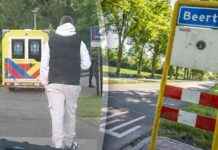Staring into space, Lasse Stolley, 17, observes the green landscapes of Thuringia, in east-central Germany. “I just like to look out the window and admire the German panoramas,” says the young teenager, sitting in a seat on a Deutsche Bahn (DB) Intercity-Express ICE train. The miner, slender and baby-faced, is not a geographer, but a developer. Every day, he travels 1000 kilometers aboard the German railway company where he has taken up residence. He has no fixed accommodation by choice, sleeps on first class seats on trains, eats in train stations and showers in public swimming pools. A lifestyle adopted more than a year and a half ago, where only his noise-canceling headphones provide him with a little privacy. “I have traveled more than 500,000 kilometers,” estimates the young man.
To live as a nomad
In his room, during the summer of 2022, Lasse has a revelation while watching a documentary on YouTube, his main occupation. He has just obtained his secondary school certificate shortly before his 16th birthday. He decides to travel as he pleases unlimitedly using a Bahncard 100, an equivalent of the SNCF TGV Max subscription in France, but more advantageous. All that remained was to convince his parents, who were not necessarily willing to let their son adopt such a lifestyle. Especially since before making this decision, the teenager had only taken the German high-speed train, the ICE, twice. Immature whim or conscious decision? “I was particularly insistent and the decision was ratified in two days,” he smiles. After taking care of the final administrative details, he left the family home in Fockbek, in the north of the country, to make his first trip to Munich on August 8, 2022.
The first steps into this new way of life were tough: missed connections and nights spent in an unfamiliar environment, comfort gone, sleep disrupted. “At first, I wanted to settle down and have a permanent home, but I got used to this way of living over time,” he admits. His belongings are reduced to the bare minimum: in his 36-liter hiking backpack, Lasse stores his laptop, his four t-shirts, his two pairs of pants, a sweater, a travel cushion and a toiletry bag. And then that’s all. For sustenance? He helps himself in the free buffets in the Deutsche Bahn lounges in the major stations, eats on board the train or goes to the supermarkets. For hygienic needs? Public swimming pools serve as his bathroom: he showers and washes there. His nights? Passed on the seats of ICE night trains. On board, the train controllers are often amused; they never found anything to complain about, he assures.
Another person initially wary of this lifestyle was his boss of a small IT start-up based in Cologne. “We tried to work in this way and it did not affect the quality of my work,” describes the application developer. On the train, his iPhone has become an essential part of his daily life. “I have already programmed applications myself to better plan my daily life.”
Have a social life
Even if he had to give up all intimacy, and therefore part of his private life, his new life allowed him “to meet many friends on the train or in station lounges”. “I don’t feel lonely, I have a few relatives scattered around the country who I see easily and quickly,” assures the programmer, who adds that he visits his parents monthly. The unexpected also allowed him to make friends with new people. “I wanted to go by train from Frankfurt to Hamburg, and the train stopped unexpectedly at Düsseldorf airport,” he says. We were stuck for several hours, then I struck up a conversation with other passengers. We ended up walking almost two hours to reach the city’s central station.” He also took advantage of his appetite for rail travel to discover Europe and its geographical extremes: in November, he went to Istanbul. In mid-December, he reached Narvik, a Norwegian city located in the Arctic Circle.
His nomadic life has many advantages, according to him. “I have the freedom to be able to decide every day where I want to be the next day based on my desires, or even in a few hours. I am completely independent and flexible. » A thirst for freedom which materializes in his desire to hike in the Alps, discover a big city, or relax in a seaside resort on the Baltic Sea. He reports on his daily life on his Instagram account, with his numerous stories where he depicts his adventures, and his escapades, such as the one where he climbs the Zugspitze, the highest peak in Germany with an altitude of 2962 meters. On the rails, he alternates between marveling at “the passing landscapes”, his “hours of work” and “the YouTube videos” consumed by the dozens.
This lifestyle has a relatively high cost: if his BahnCard 100 first class card allows him to travel to the four corners of the country, the youth subscription costs him 5,888 euros per year. Add to this the various purchases, a renewal of his goods which necessarily wear out more quickly due to the frequency of use, and Lasse estimates the annual cost of his lifestyle at “10,000 euros”. The financial support from his parents relieves him. The teenager knows “that he will not live on the train forever”, but wishes to maintain this functioning “for a few years”. “I will do it as long as I enjoy it.”




















